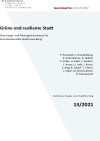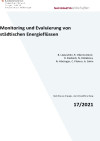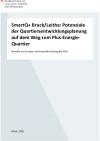Suchergebnisse
Grüne und resiliente Stadt - Steuerungs- und Planungsinstrumente für eine klimasensible Stadtentwicklung

Ziel des Projekts war ein „Proof of Concept“ eines Regelkreises und Tool-Sets zur Steuerung, Optimierung und Evaluierung einer grünen und klimasensiblen Stadt(teil)planung bestehend aus städtebaulichen und freiraumplanerischen Instrumenten sowie Klimasimulationen auf unterschiedlichen Maßstabsebene.
Schriftenreihe
13/2021
F. Reinwald, C. Brandenburg, P. Hinterkörner, B. Hollósi, C. Huber, A. Kainz, J. Kastner, F. Kraus, U. Liebl, J. Preiss, Z. Ring, B. Scharf, T. Tötzer, J. Züger, M. Žuvela-Aloise, D. Damyanovic
Herausgeber: BMK
Deutsch, 124 Seiten
Downloads zur Publikation
BIMaterial Process Design for Material Building Pass
Building Information Modelling supported compilation of a Material Building Pass; as a qualitative and quantitative documentation of the material composition of, and the material distribution within, a building structure. This project is a central milestone towards standardized, BIM-generated building material passes.
SOFC4City - SOFC-waste heat utilization for buildings and industry
In this project the application of a solid oxide fuel cell (SOFC) for energy supply (heat and power) of urban areas will be investigated. Due to the high temperature level of the produced heat it would be possible to use this heat for the energy supply of different heat and power consumers (residential buildings, industrial plants, etc.). One aim is to provide the SOFC-heat at several temperature levels in order to establish the advantages of the fuel cell. On the one hand the legal and market-based conditions will be evaluated, on the other hand the technological feasibility will be scoured by the use of CFD-simulation of the heat production.
E_PROFIL - Quartiersprofile für optimierte energietechnische Transformationsprozesse
Mit E_PROFIL, als Methodenset zur Erstellung von Quartiersprofilen, wird ein wichtiger EDV-gestützter Werkzeugkasten geschaffen, der in der Planungspraxis österreichischer Städte zur Anwendung kommen wird, um eine energie- und ressourceneffiziente Stadtentwicklung zu unterstützen. Er ist ein wertvolles Asset für die Forschungs- und Planungsaktivitäten in Siedlungsverbänden.
Monitoring und Evaluierung von städtischen Energieflüssen

Ausgangsbasis für das Projekt sind die Energiestatistiken. In einem ersten Schritt wird die Erhebungsmethodik im Detail analysiert. Basierend auf den Erkenntnissen der Analyse wird eine Methodik zur Erstellung städtischer Energieflüsse erstellt. Diese wird mithilfe des zu entwickelnden Planungsinstruments "Senflusk" an 5 Referenzstädten getestet.
Schriftenreihe
17/2021
B. Lepuschitz, R. Obernosterer, H. Daxbeck, N. Kisliakova, N. Hörzinger, C. Ploiner, A. Sahin Berichte aus Energie- und Umweltforschung 17/
Herausgeber: BMK
Deutsch, 65 Seiten
Downloads zur Publikation
Eco.District.Heat - Potentials and restrictions of grid-bound heating systems of urban areas
Aim of the project Eco.District.Heat is to provide strategic decision-making support that enables Austrian towns and cities to deal with aspects of grid-bound heating (and cooling) systems in accordance with integrated spatial and energy planning from a holistic perspective when elaborating urban energy concepts.
BIMaterial Prozess-Design für einen BIM-basierten, materiellen Gebäudepass
Generierung des materiellen Gebäudepass (MGP) - Dokumentation der materiellen Zusammensetzung eines Bauwerkes, die quantitative und qualitative Auskunft über die relevanten Rohstoffe in einem Bauwerk gibt. Als Information und Datenbasis für das MGP wurde die Building Information Modelling Methode und ein digitales Gebäudemodell verwendet. Als Ergebnis wurde ein Pflichtenheft für eine BIM-basierte MGP App geschaffen werden.
CiQuSo Stadtquartiere mit optimierten solar-hybriden Heiz- und Kühlsystemen
Das Forschungsansuchen untersucht, evaluiert und optimiert effiziente Systemlösungen zur solaren Energieversorgung auf Gebäude- und Stadtquartiersebene. Die Anwendbarkeit der entwickelten Konzepte wird am Beispiel des Salzburger Stadtquartiers Itzling demonstriert.
KELVIN - Reduktion städtischer Wärmeinseln durch Verbesserung der Abstrahleigenschaften von Gebäuden und Quartieren
Potentialabschätzung einer möglichen Abschwächung des Auftretens städtischer Wärmeinseln durch die Veränderung der Oberflächenalbedo unterschiedlicher Stadtstrukturen (Boden, Dachflächen, Dachbegrünung etc.) bzw. damit verbundener Energieeinsparung durch Reduktion des Kühlungsbedarfs und Emissionsreduktion, um positive Auswirkungen auf Gesundheit und Lebensqualität (Human- und Wohnkomfort) in Städten zu ermöglichen.
SIMULTAN - Simultane Planungsumgebung für Gebäudecluster in resilienten, ressourcen- und höchst energieeffizienten Stadtteilen
Es soll die Möglichkeit zur Steigerung der Effizienz gebäudeübergreifender Energiesysteme geschaffen werden um dem Ziel resilienter Städte und Stadtteile mit hoher Lebensqualität, Ressourcen- und Energieeffizienz nahe zu kommen. Ziel war ein auf simultaner technischer Planung basierendes praxistaugliches Werkzeug zur Entscheidungsunterstützung bei Sanierungs- und Neubauplanungen (bis zu Plusenergiegebäuden) in hocheffizienten Stadtteilen.
Eco.District.Heat - Potenziale und Restriktionen leitungsgebundener Wärmeversorgung in Stadtquartieren
Ziel des Projektes Eco.District.Heat ist es, eine strategische Entscheidungshilfe für österreichische Städte zu entwickeln, mit der das Themengebiet leitungsgebundene Wärme- (und Kälte-) Versorgung in städtischen Energiekonzepten in Abstimmung mit energieraumplanerischen Fragestellungen aus ganzheitlicher Perspektive bearbeitet werden kann.
Urban Area Parameter – Kennwerte Siedlungsbewertung für Errichtung, Betrieb und Mobilität in klimaverträglichen Siedlungen
Entwicklung und Abstimmung von Kennwerten für die energetische und ökologische Bewertung von Siedlungen auf Basis der Schweizer 2000-Watt-Arealzertifizierung. Die Ergebnisse bilden einen weiteren Baustein zum Aufbau eines Qualitätssicherungssystems für Siedlungen ähnlich der klimaaktiv Deklaration für Gebäude bzw. der e5 Zertifizierung für Gemeinden.
SmartQ+ Bruck/Leitha - Potenziale der Quartiersentwicklungsplanung auf dem Weg zum Plus-Energie-Quartier
Erstmalige Verknüpfung von Verkehrs- und Energiesimulationsmodellen für die kommunale Planung um (Energie-) Einsparungspotenziale in der Siedlungsentwicklung bzw. die Auswirkungen von Planungsvorhaben auf die Mobilitätsnachfrage und das Energienetz einer Gemeinde in einer interaktiven Visualisierung sichtbar zu machen.
SmartQ+ Bruck/Leitha - Energy saving potentials through neighbourhood and community planning
First-time linking of transport and energy simulation models for municipal planning in order to visualise (energy) saving potentials in settlement development and effects of planning projects on mobility demand and the energy network of a municipality in an interactive visualisation.
SmartQ+ Bruck/Leitha: Potenziale der Quartiersentwicklungsplanung auf dem Weg zum Plus-Energie-Quartier

Erstmalige Verknüpfung von Verkehrs- und Energiesimulationsmodellen für die kommunale Planung um (Energie-) Einsparungspotenziale in der Siedlungsentwicklung bzw. die Auswirkungen von Planungsvorhaben auf die Mobilitätsnachfrage und das Energienetz einer Gemeinde in einer interaktiven Visualisierung sichtbar zu machen.
Schriftenreihe
88/2025
S. Bindreiter, Y. Şişman, L. Rast, S. Sint, S. Hinterseer, E. Selz, K. Mottl, R. Roggenbauer
Herausgeber: BMIMI
Deutsch, 122 Seiten
